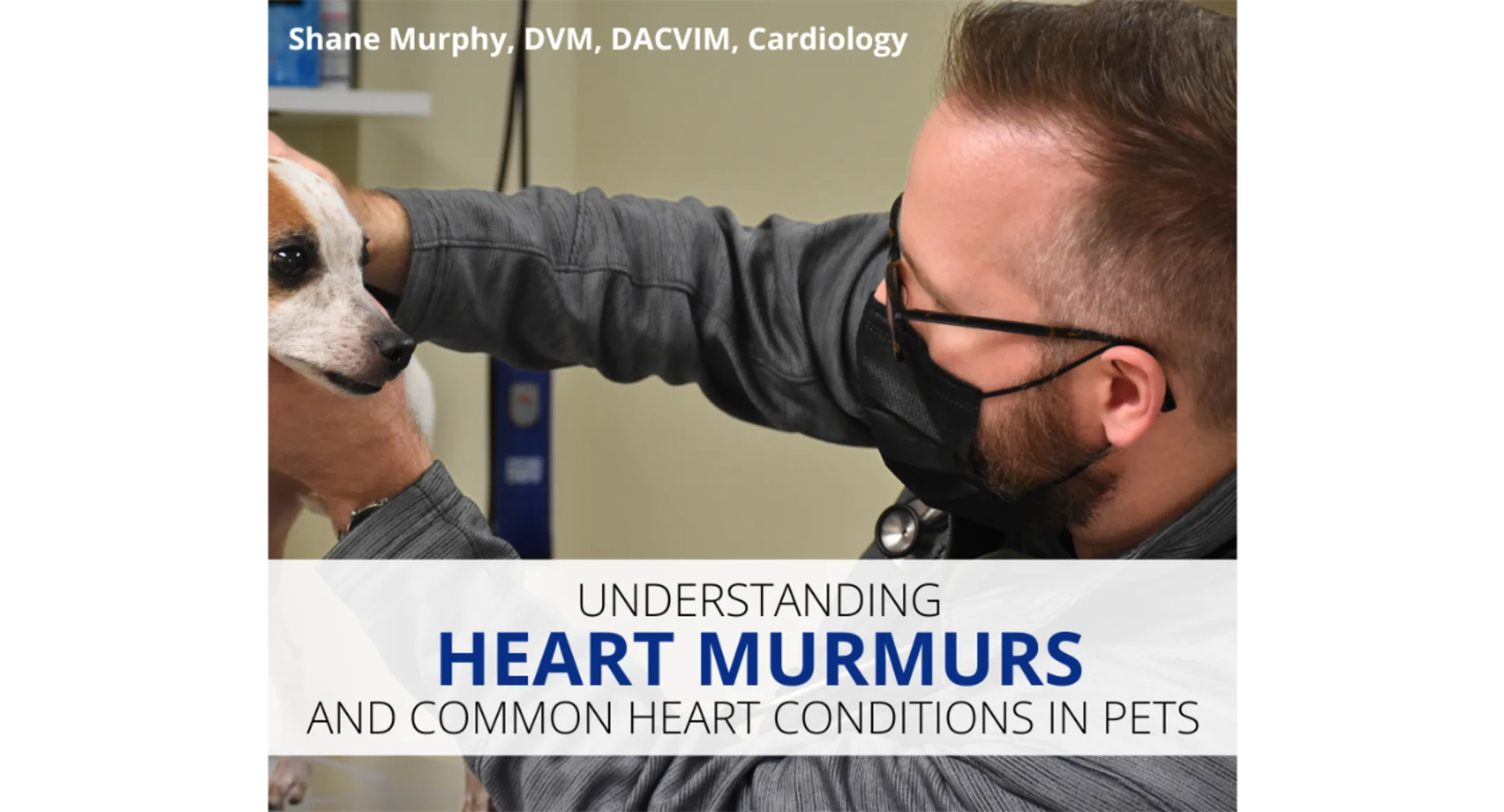Understanding Heart Murmurs and Common Heart Conditions in Pets
November 12, 2024 · Health Tips

Introduction to Heart Health in Pets
Heart health is essential for pets, as their hearts play a critical role in circulating blood throughout the body. This circulation supplies vital oxygen and nutrients to organs, supporting overall health and wellness. Whether it’s a lively dog or a calm cat, a healthy heart ensures pets can enjoy life with ease, respond to exercise, and handle stress more effectively.
What is a Heart Murmur?
A heart murmur is the sound of turbulent blood flow within or around the heart, audible to veterinarians through a stethoscope. Normally, blood flow is smooth and silent, but a murmur suggests abnormal flow patterns. Heart murmurs range from mild to severe and are categorized by their grade and location. However, a louder murmur doesn’t always mean more severe disease. Any murmur should prompt further evaluation, ideally by a veterinary cardiologist, as it may signal underlying heart conditions.
Common Causes of Heart Murmurs in Pets
Heart murmurs can stem from congenital issues (present at birth) or acquired conditions (developed over time). Congenital heart diseases may be inherited or occur randomly, presenting at birth and ranging from mild to severe. Acquired heart diseases, more common in middle-aged or older pets, develop as they age. Conditions such as valve abnormalities, cardiomyopathy, and heart infections can all lead to murmurs, affecting blood flow and heart function.
Other Common Heart Conditions in Pets
Dilated Cardiomyopathy (DCM): DCM is an acquired condition primarily affecting certain dog breeds, including Dobermans, Great Danes, and Irish Wolfhounds, due to genetic predispositions. Occasionally linked to diet or infections, DCM involves the progressive weakening and dilation of the heart muscle, impacting its ability to pump blood efficiently.
Hypertrophic Cardiomyopathy (HCM): HCM is the most common heart condition in cats, affecting about 15% of the feline population. Breeds such as Maine Coon cats, Ragdolls, and Sphynx cats are particularly at risk. HCM causes the heart walls to thicken, which hinders the heart’s ability to relax properly.
Myxomatous Mitral Valve Disease (MMVD): Representing 75% of diagnosed heart disease in dogs, MMVD often affects smaller breeds, including Cavalier King Charles spaniels and miniature Poodles. In MMVD, the mitral valve thickens and leaks, causing a characteristic murmur and leading to fluid pressure overload in the heart.
Signs and Symptoms of Heart Disease in Pets
If detected early, many heart conditions in pets have a prolonged period where no symptoms are present; it is best to detect and diagnose heart disease BEFORE symptoms develop, ideally with a veterinary cardiologist. Heart disease symptoms can be varied and subtle, and early signs might include coughing, rapid breathing, lethargy, or fainting episodes. As heart disease progresses, pets may develop congestive heart failure (CHF), a condition where fluid builds up in the lungs or abdomen, causing breathing difficulties and other health issues. Pet owners should monitor for these symptoms, as early detection can improve outcomes.
Diagnostic Tools and Procedures
Veterinarians may use several diagnostic tools to evaluate heart health, including echocardiograms with a cardiologist, X-rays, and blood tests. These tools allow for a precise assessment of the heart’s structure and function, helping to identify heart conditions accurately and guide treatment. At Mission Veterinary Emergency & Specialty, we offer a wide range of diagnostic tests and services, including echocardiography, electrocardiography, chest X-rays, blood pressure measurement, and more.
Treatment Options for Heart Conditions
Treatment options for heart conditions vary depending on the diagnosis and may include medications, lifestyle changes, or even surgery. Early intervention is key, as it may slow disease progression and improve quality of life. Regular check-ups for pets with heart conditions are essential to monitor changes and adjust treatment as needed.
How Pet Owners Can Support Their Pet’s Heart Health
Owners can support heart health through a balanced diet, regular exercise, and annual veterinary check-ups to catch potential issues early. Preventive care, including routine exams and monitoring, can go a long way in maintaining a healthy heart for pets. If evidence of a heart condition is detected (heart murmur, abnormal heart rhythm, etc), early evaluation with a veterinary cardiologist is recommended.
Conclusion
Many heart conditions in pets can be managed with proper care and support. Pet owners should feel encouraged to reach out to their veterinarian if they have any concerns about their pet’s heart health, as proactive care can make a meaningful difference. Our veterinary cardiologist, Dr. Shane Murphy is available by consultation appointment Tuesday - Friday. To schedule a consultation or learn more about our cardiology department at MVES, click HERE.
